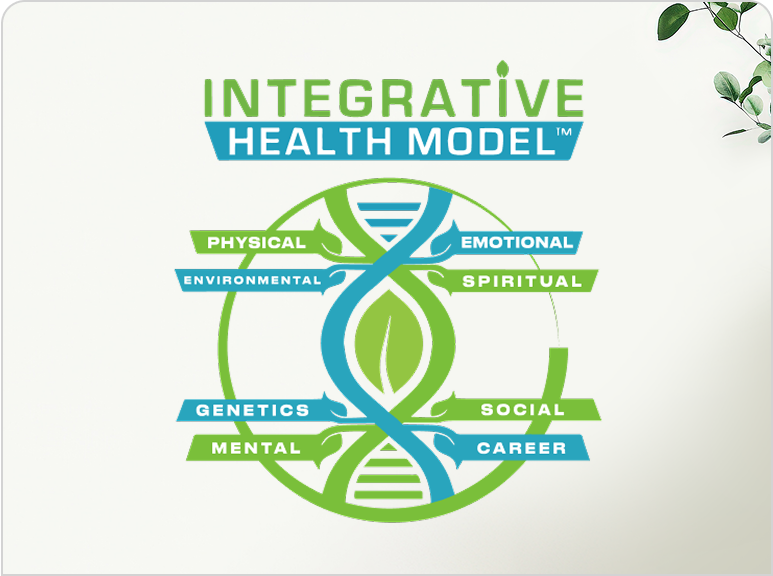How Adaptogens Can Help Your Body Manage Stress?

Adaptogens are natural herbs and plants like ashwagandha, rhodiola, and ginseng that help your body adapt to and manage stress more effectively. They work by regulating your body's stress response system, potentially lowering cortisol levels and supporting adrenal function. Regular use of adaptogens may help reduce fatigue, improve mental clarity, and enhance your overall resilience to both physical and emotional stressors.
You'll also discover practical strategies for weaving adaptogens into a comprehensive wellness plan, complemented by IV nutrient therapy, mindful lifestyle shifts, and functional health principles, all while understanding crucial safety considerations and the value of professional guidance. Finally, authentic patient experiences from Cutler Integrative Medicine in Michigan will showcase how bespoke adaptogen protocols can profoundly transform your approach to stress management.
Understanding Adaptogens: Your Body's Stress Allies
Adaptogens are natural botanical agents that enhance your body's inherent ability to withstand stress, fostering a return to homeostasis and elevating overall well-being by fine-tuning key hormonal and neurochemical pathways. They achieve this by supporting the hypothalamic-pituitary-adrenal (HPA) axis, balancing cortisol production, and fortifying cellular defenses against stress. For instance, adaptogens can effectively counteract the detrimental effects of chronic cortisol elevation, which often leads to exhaustion, sleeplessness, and weakened immunity, positioning them as fundamental partners in a holistic stress management strategy.
The Essence and Origins of Adaptogens
First identified and classified by Soviet researchers in the 1940s, adaptogens are defined as natural substances that non-specifically amplify the body's resilience to stressors, whether they stem from physical exertion, chemical exposure, or biological challenges. Their historical lineage traces back to Ayurvedic and Traditional Chinese Medicine, where herbs such as Withania somnifera (Ashwagandha) and Panax ginseng were traditionally administered to enhance endurance and recovery for warriors and laborers. Contemporary scientific inquiry has since validated these ancient applications, confirming adaptogens' remarkable capacity to cultivate resilience and maintain physiological equilibrium.
The Science Behind Adaptogen Action: Regulating Stress and Cortisol
Adaptogens orchestrate stress regulation primarily by modulating the HPA axis, the body's central stress response network involving the hypothalamus, pituitary gland, and adrenal cortex. Their balancing act is achieved through several sophisticated mechanisms:
- HPA Axis Harmony – Adaptogens influence signaling at each level of the HPA axis to normalize the release of ACTH and cortisol.
- Cortisol Receptor Sensitivity – Specific compounds within adaptogens can enhance the responsiveness of glucocorticoid receptors, preventing the system from becoming overstimulated.
- Cellular Defense Against Oxidative Stress – Adaptogens bolster the body's natural antioxidant defenses, counteracting the cellular damage caused by elevated cortisol levels.
- Neurotransmitter Equilibrium – Many adaptogens play a role in regulating key neurotransmitters like serotonin, GABA, and dopamine, contributing to a more stable mood under duress.
This integrated action promotes a state of balance, alleviates feelings of anxiety, and conserves vital energy reserves, forming the biochemical foundation for their stress-reducing benefits.
Adaptogens, Stress, and the HPA Axis: A Deeper Look
Herbs renowned as adaptogens, including cordyceps, holy basil, eleuthero, and rhodiola rosea, have been utilized for millennia to enhance stress tolerance and invigorate the body by supporting the HPA axis and promoting homeostasis.This insight reinforces the article's assertion regarding adaptogens' role in supporting adrenal health and immune function.
Distinguishing Adaptogens from Stimulants and Other Supplements
Unlike stimulants such as caffeine or synthetic nootropics, which typically induce a temporary state of heightened arousal by directly activating the central nervous system, adaptogens offer balanced support without the risk of overstimulation or subsequent energy crashes. The following table highlights their key differences:
This comparison clearly illustrates the unique capacity of adaptogens to foster systemic adaptability to stress, rather than merely masking symptoms or providing a transient energy boost.
Top Adaptogens for Navigating Stress and Anxiety
The Calming Power of Ashwagandha for Stress and Anxiety

Ashwagandha (Withania somnifera) effectively mitigates stress by lowering circulating cortisol levels and enhancing GABAergic signaling within the brain. Clinical studies have demonstrated:
- Recommended Dosage: 300–600 mg of a standardized extract daily
- Observed Benefit: A reduction in cortisol levels ranging from 27% to 44% within 60 days
- Underlying Mechanism: Its active compounds, withanolides, help inhibit stress-induced HPA axis overactivity
Ashwagandha: A Boon for Stress, Anxiety, and Sleep?
Emerging research indicates that ashwagandha extracts may effectively reduce stress, anxiety, and cortisol levels. Studies have shown that participants taking ashwagandha experienced significant reductions in stress and anxiety, improved sleep quality, and lower serum cortisol levels compared to those taking a placebo.This finding supports the article's assertion that Ashwagandha is a valuable tool for alleviating stress and anxiety.
Consistent use of Ashwagandha promotes more restful sleep, a calmer emotional state, and enhanced resilience to everyday pressures, establishing it as a foundational adaptogen in integrative health practices.
Ashwagandha: Exploring Its Health Benefits, Potential Side Effects, and Usage
Ashwagandha may offer a calming influence on anxiety symptoms. A 2019 study revealed that a daily intake of 240 milligrams (mg) of ashwagandha led to a significant decrease in participants' stress levels compared to a placebo group.This evidence corroborates the article's claim regarding Ashwagandha's efficacy in managing anxiety.
The Stress-Fighting Advantages of Rhodiola Rosea
Rhodiola Rosea combats both mental and physical fatigue by boosting ATP production within mitochondria and influencing serotonin and norepinephrine pathways. Its key benefits include:
- Typical Dosage: 200–400 mg, standardized to contain 3% rosavins and 1% salidroside
- Reported Effects: Enhanced mental endurance, with cognitive performance under stress improving by 20–30%
- Mechanism of Action: Inhibition of MAO-A and COMT enzymes helps preserve mood-regulating neurotransmitters
Rhodiola: Unpacking Its Mental Health Benefits, Side Effects, and More
Rhodiola rosea is recognized by some researchers as an adaptogen that may stimulate activity in serotonin, norepinephrine, and dopamine pathways, all crucial for healthy emotional and neurological function.This statement supports the article's claim that Rhodiola Rosea is effective in combating mental and physical fatigue.
This adaptogen is particularly beneficial for individuals facing demanding work schedules or engaging in strenuous physical activity, offering both enhanced mental clarity and sustained endurance.
Assessing the Efficacy of Rhodiola rosea L. Preparations in Mitigating Life-Stress Symptoms and Stress-Induced Conditions: Promising Clinical Findings
Rhodiola rosea L. boasts a long history of use in traditional medicine for stimulating the nervous system, treating stress-related fatigue and depression, improving physical performance and work productivity, and addressing gastrointestinal issues and impotence.This historical context validates the article's assertion that Rhodiola Rosea helps combat mental and physical fatigue.
How Holy Basil, Schisandra, and Eleuthero Enhance Stress Management
In addition to Ashwagandha and Rhodiola, three other adaptogens contribute significantly to a balanced stress-response regimen:
- Holy Basil (Ocimum sanctum) supports immune health and helps reduce inflammatory cytokines, thereby easing the physiological impact of chronic stress.
- Schisandra (Schisandra chinensis) aids in enhancing liver detoxification enzymes and regulating cortisol metabolism, promoting recovery from stress.
Eleuthero (Siberian Ginseng) improves the body's oxygen utilization and neuromuscular coordination, effectively counteracting stress-induced fatigue
Adaptogens: Supporting Your Health Through Stress-Related Challenges
The Role of Adaptogens in Managing Anxiety and Mood Disorders
Adaptogens such as Ashwagandha and Holy Basil help alleviate anxiety by modulating GABA, serotonin, and HPA axis activity.
Adaptogens for Anxiety Relief
Adaptogens often prove to be exceptionally beneficial supplements in this domain, as they assist in reducing stress and promoting a state of homeostasis. Among the most extensively researched herbs for anxiety are Ashwagandha, Rhodiola rosea, lavender, chamomile, maca, and numerous others.This highlights the article's point that adaptogens are effective in providing anxiety relief.
Clinical findings consistently show marked improvements in mood scores and a reduction in panic symptoms when adaptogens are incorporated into therapeutic plans alongside counseling or mindfulness practices, underscoring their value in holistic mental health care.
Can Adaptogens Alleviate Chronic Fatigue and Boost Energy?
By optimizing mitochondrial function and rebalancing cortisol levels, Rhodiola and Eleuthero offer significant relief from chronic fatigue and adrenal exhaustion. Individuals often report a sustained increase in energy levels without experiencing jitters, positioning adaptogens as a gentle yet potent alternative to conventional stimulants for managing fatigue.
Enhancing Sleep Quality with Adaptogens
.jpg)
Adaptogens contribute to improved sleep by harmonizing cortisol rhythms and bolstering GABAergic pathways. The withanolides found in Ashwagandha and the lignans in Schisandra have been shown to reduce the time it takes to fall asleep and enhance the quality of restorative sleep stages, aiding those with stress-induced insomnia in achieving deeper, more rejuvenating rest.
Adaptogens & Sleep: Can They Enhance Your Rest?
Adaptogens work on a deeper physiological level by helping to regulate hormones that influence your sleep-wake cycle, most notably cortisol, the stress hormone. Persistent stress often leads to elevated cortisol levels, which can disrupt normal sleep patterns. Adaptogens assist in lowering cortisol, reducing anxiety, and fostering a sense of calm, thereby facilitating the transition into restorative sleep.This explanation supports the article's claim that adaptogens can significantly improve sleep quality.
Adaptogens: Supporting Adrenal Vitality and Immune Resilience
Adaptogens offer protection to the adrenal glands against chronic overstimulation by ACTH and strengthen the immune system through their antioxidant and anti-inflammatory actions. For example, the eugenol and ursolic acid compounds in Holy Basil have been observed to reduce pro-inflammatory markers, reinforcing the critical link between immune function and stress resilience.
Integrating Adaptogens into Your Comprehensive Stress Management Strategy
Synergistic Benefits: Adaptogens with IV Nutrient Therapy and Functional Wellness
At Cutler Integrative Medicine, we frequently incorporate adaptogens into treatment plans alongside specialized IV nutrient infusions—such as B-vitamin complexes and magnesium—to create a synergistic effect that enhances cellular energy production, supports adrenal enzyme function, and accelerates recovery from stress. This integrated approach combines the power of botanical modulation with essential micronutrient replenishment for profound homeostatic restoration.
Dietary and Lifestyle Adjustments to Amplify Adaptogen Efficacy
To maximize the benefits derived from adaptogens, consider adopting these supportive lifestyle practices:
- Nutrient-Rich Diet – Focus on consuming anti-inflammatory foods abundant in omega-3 fatty acids, magnesium, and antioxidants.
- Consistent Sleep Schedule – Adhere to regular sleep and wake times to reinforce your body's natural circadian cortisol rhythms.
- Adequate Hydration – Ensuring sufficient water intake is crucial for optimal herb absorption and efficient detoxification processes.
The Combined Power of Mindfulness, Exercise, and Adaptogens
Integrating adaptogens with mindfulness practices, such as meditation and breathwork, alongside moderate physical activity like yoga or walking, creates a powerful synergistic effect. This combination helps lower cortisol levels, enhances neuroplasticity, and builds greater resilience to stress, fostering both physiological and psychological adaptation.
Safety First: Understanding Adaptogen Use, Side Effects, and Precautions
When to Seek Professional Guidance Before Using Adaptogens
Individuals managing hormone-sensitive conditions, pregnant or breastfeeding women, and those taking immunosuppressants or thyroid medications should consult with a healthcare provider before initiating an adaptogen regimen. A qualified naturopathic physician can develop personalized protocols based on comprehensive assessments, including genetic, hormonal, and nutrient status evaluations.
Potential Side Effects and Interactions to Be Aware Of
Adverse effects from adaptogens are uncommon and typically mild, such as minor digestive discomfort or slight drowsiness, which often subside with dosage adjustments. However, adaptogens may interact with certain medications, including sedatives, blood thinners, and antihypertensives. Close monitoring by an integrative medicine practitioner is essential to mitigate risks and optimize therapeutic outcomes.
Ensuring Quality and Ethical Sourcing of Adaptogenic Herbs
Prioritize brands that provide third-party testing for contaminants like heavy metals and pesticides, and that verify the potency of active constituents. Opt for organic, sustainably harvested extracts that are standardized for key compounds (e.g., withanolides in Ashwagandha, rosavins in Rhodiola) to guarantee purity and effectiveness.
Patient Perspectives: Adaptogen Success Stories at Cutler Integrative Medicine
Transforming Lives in Michigan with Personalized Adaptogen Protocols
Following three months of customized adaptogen plans, integrated with IV therapy and lifestyle coaching, patients report significant improvements, including a 40–60% reduction in perceived stress levels, enhanced sleep quality, and increased daily energy. These remarkable outcomes highlight the effectiveness of addressing root causes and providing individualized care.
Complementary Integrative Services at Cutler Integrative Medicine
Our comprehensive suite of services includes in-depth naturopathic consultations, advanced hormone and genetic testing, targeted IV nutrient therapy, functional wellness assessments, and convenient telemedicine follow-ups. This multidisciplinary approach ensures that adaptogen therapy is administered safely, precisely, and in alignment with each patient's unique health profile and objectives.
Frequently Asked Questions
What Are Adaptogens, and How Swiftly Do They Impact Stress?
Adaptogens are plant-based compounds designed to normalize the body's stress response systems. Many individuals begin to notice improvements in mood and energy levels within 2–4 weeks, with the full spectrum of benefits typically emerging after 8–12 weeks of consistent use.
Which Adaptogens Are Most Effective for Anxiety and Fatigue?
Ashwagandha is particularly well-suited for addressing anxiety and supporting sleep, while Rhodiola Rosea excels in alleviating mental and physical fatigue. Holy Basil offers additional benefits for immune support and inflammatory balance.
Is Daily Use of Adaptogens Safe?
For the most part, adaptogens are considered safe for daily consumption at recommended dosages, with a low incidence of side effects. Rotating between different adaptogens and incorporating periodic breaks can further enhance safety and maintain efficacy.
How Do Adaptogens Influence Cortisol and the HPA Axis?
Adaptogens interact with multiple regulatory points within the HPA axis to smooth out cortisol fluctuations, improve receptor sensitivity, and mitigate chronic overactivation. This action ultimately restores hormonal balance and strengthens the body's resilience to stress.
Adaptogens present a scientifically validated, plant-based strategy for adapting and thriving amidst life's stressors. By leveraging their unique mechanisms in conjunction with integrative therapies, such as personalized IV nutrient plans, individuals can achieve a more balanced stress response and significantly enhance their overall quality of life. For personalized guidance and to explore how adaptogens can benefit you, we invite you to connect with a naturopathic physician to design a comprehensive protocol tailored to your specific health aspirations.
You May Also Like




.png)

.png)



%201.png)



.png)

.png)



.png)
.png)
.png)
.png)
.png)
.png)
.png)
.png)

.png)
.png)
.png)
.png)

.png)
.png)

.png)
.png)






.png)




.png)
.png)
.png)

.png)

.png)